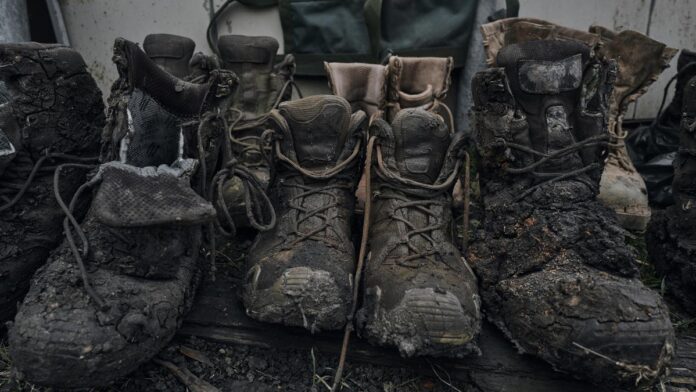
Boots of wounded Ukrainian soldiers placed near a medical point at the frontline in Bakhmut, Donetsk region, Ukraine.
| Photo Credit: AP
Some of India’s greatest literature reached Ukraine in an unusual way. In the late 19th century, a young woman named Larysa Kosach received a present from her uncle, a well-known Ukrainian intellectual. It was a French translation of the Rigveda, among the most sacred of Hindu texts. Kosach, a brilliant poet fluent in 10 languages, was so impressed with the beauty of its verses that she was determined to share them with her fellow Ukrainians. She was the first person to translate the Rigveda into our language and went on to become one of my country’s most celebrated poets. She has since become known as Lesya Ukrainka and her Rigveda translation is still read today in Ukrainian schools.
Now, it is our turn to send India some poetry. These are very difficult days for Ukraine, but the creative forces that set us apart from those who would destroy us have not been extinguished. As Russian missiles bomb our cities and Russian soldiers steal our children, a new generation of Ukrainian voices are speaking up in search of sympathetic ears. As Iya Kiva, one of our younger poets, puts it: “We’ve packed a contraband humanitarian aid kit of war songs/ and shipped it to Europe America India and China/ paving the silk road with great Ukrainian literature.”
Victims of Russian belligerence
In Ukraine we are no strangers to the harsh realities of modern geopolitics. We know, of course, that we cannot rely on poetry alone to deliver us from the clutches of Russian President Vladimir Putin, whose lust for territory and power is out of step with the 21st century longing for peaceful, prosperous co-existence. We also know that some of the countries with which Ukraine has long enjoyed mutually rewarding relations — not only in recent years but both before and during the ages of Soviet rule — face testing decisions of their own in a world that Russia is trying to reshape for the benefit of the Kremlin’s kleptocrats. We are especially grateful to Prime Minister Narendra Modi for his skilful interventions at the highest political levels. We recognise that India has long enjoyed a stable and productive relationship with Moscow. But the Kremlin of today is not the Kremlin of yesterday. As the prime victims of Russian belligerence, we wholeheartedly endorse what Mr. Modi told Mr. Putin last year: “Today’s era is not an era of war”.
At the same time, we worry that those words have fallen on deaf Russian ears. As I write today, Russian armies are still firing missiles into civilian Ukrainian homes. The destruction has included hospitals, schools and blocks of flats. Independent observers have detailed massacres, torture and rape committed by Russian soldiers, many of them former convicts pressed into military service. In Ukrainian territories occupied by Russian troops, local government officials, journalists and protestors have been arbitrarily detained and beaten or tortured. Some of them have disappeared.
The United Nations has documented more than 40,000 alleged Russian war crimes. Earlier this month, the International Criminal Court in The Hague issued arrest warrants for Mr. Putin and one of his officials for allegedly presiding over the horrifying deportation of hundreds of Ukrainian children to Russia. Mr. Putin to issue shocking threats of nuclear attack.
These are not the actions of a reliable partner, or indeed of any sane government leader. With his unceasing aggression in Ukraine, Mr. Putin has forfeited any claim to the loyalty of his former friends. Desperate in defeat, he has been trawling the world in search of any ally prepared to overlook his evil. He had high hopes of forging a political and economic alliance with China against the rest of the world, but he left Beijing disappointed. For all the flowery words that accompanied his recent summit meeting with President Xi Jinping, most observers concluded that China was keeping its distance from a tyrant who no one can trust.
Similar views
We are lucky to enjoy warm diplomatic relations with India, and I think I am right to claim that our views are similar in two important respects. First, we did not seek war with Russia; like India, we only fight if we are attacked. Second, we share India’s belief that a rebalancing of international institutions is long overdue in the world.
Russia has discredited itself as a permanent member of the United Nations Security Council, undermining global faith in an outmoded structure. The Council was created in the aftermath of the Second World War with a mission to maintain world peace — a task it has manifestly failed to achieve. However long it takes to rid the world of Russia’s malevolent excesses, Mr. Modi’s campaign for UN reform deserves to succeed.
Ukraine also wholeheartedly endorses Mr. Modi’s theme for India’s current presidency of the G20: ‘Vasudhaiva Kutumbakam’. Ukrainian President Volodymyr Zelensky echoed this message when he revealed our formula for peace at the G20 summit last year. The plan involves simple but necessary steps which are familiar to every human being who respects themselves, other people, and the world around them. Those who oppose the plan also oppose energy, food, nuclear and environmental security.
At difficult times like this, it is helpful to remember one of the Rigveda verses translated by Lesya Ukrainka. It was a hymn dedicated to Indra, king of the devas, who destroyed the evil Vritra, bringing sunshine to mankind. In Ukraine, we too are fighting evil. But we can only return to our lives in sunshine with the help of our friends all over the world.
Andriy Yermak is the head of the Office of the Ukrainian Presidency
#Fighting #Kremlin #today
